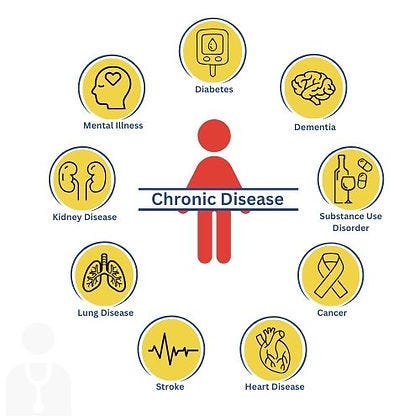We’re back after a weeks break. As the entire western hemisphere took a break for the year we also followed suite and took some time to reflect on what has been a very eventful year.
As this weeks newsletter will be released just before the new year, I thought we’d take a detour from the good ol' “reflect on 2024” type of post and focus on the future. I’ve been doing some “light reading” around the latest report by the UK government titled “Change NHS: Help Build a Health Service Fit for the Future.”
Now the NHS is known for releasing these 10 year plans every few years but things seem… different? The NHS historically has been very late to adapt to changing trends with regards to technology and practice. I remember sending referrals via fax machines in 2017 and using computers that were too old to run Adobe PDF readers. It’s clear that whoever is at the top, is really trying to bring the NHS in line with modern standards.
Here are some key changes we can expect in 2025.
Technology innovation - AI comes to the NHS
We’ve heard about AI many times. For most of us, it doesn’t have much real life application aside from SIRI but it is the future of all industries. So far AI is task focused, so for instance you can ask an AI bot a question and it can give you an answer based on a repository of data it holds. The focus is now to make AI function focused.
You’ve probably seen AI in action already. If you work in hospital you might have come across the concept of “command centres.” These are hubs where clinicians and bed managers are looking at a number of screens which capture real life data. This includes wait times, bed space, consultant lists and others. The idea is to use this real-time data to make more effective decisions to assist with hospital flow.
The UK is playing catch up when compared to the health systems in the rest of Europe but never late than never. Some innovations we can probably expect to emerge in 2025 include:
Referrals to NHS sanctioned apps to help with smoking cessation and CBT such as QuitGenius.
Improved access for secondary care services to view primary care data and vice versa through the integration of data centres.
Live referral platforms to aid faster decision making for hospital admissions. This would mean an AI driven screening software with a clinician setting on the other end to make a decision regarding admission from primary care.
Digital software to aid prescribing decisions including safe prescribing, antibiotic stewardship and primary prevention.
Patient Empowerment
Research has shown that the more active patients are concerning healthcare, the better their health will be. Patient’s need to be kept in the loop and shared decision making is the standard of practice employed by the NHS.
Last year (2023) patients obtained access to their patient records. Despite the fears and anticipated problems, research has thus far shown positive outcomes. Patients are more aware of referral timelines, are able to request their own medications and are in a better position to request to see certain clinicians depending on the issue.
Unfortunately, elderly populations are finding this change in landscape difficult to cope with and the fear is that they could be left behind. In light of this, we may expect to see some of the following changes:
Expansion of the NHS app. This could potentially include services linked to the presenting problem. For example, if a patient has a cough, the NHS app and associated organisations may signpost patients to useful videos or articles to help assist patients.
Expansion of telemedicine services to allow clinicians to review patients in remote areas or elderly patients with chronic diseases to improve care delivery.
Integrating pharmacists and practices. This ensures that issues such as dossettes, repeat prescriptions and even chronic disease follow up information is shared in “real-time.”
Primary Prevention
For a number of years, the NHS has led the way for primary prevention throughout the world. From NHS health checks to calculators such as QRISK, we have become very good at primary prevention. Despite this progress there is always room for improvement and 2025 could see the following changes:
Adoption of more specific calculators such as QRISK4 to expand statin therapy.
IT Integration of services such as mobile blood pressure units and pharmacies and others with surgeries to institute recalls.
Expansion of equipment such as portable ECG machines for AF diagnosis, portable BP monitors for HBPM and others
Access to Healthcare
Access has always been a problem. As well as increasing patient numbers there is also an increased complexity of issues faced by the UK public. Year-on-year we are discovering new conditions, diseases and more and this poses a significant problem for an already-stretched NHS. To help battle this, 2025 is a year where you can expect some rapid changes:
Increased diversity of the NHS workforce. This has already started with historic new roles and subspecialties in the community and hospital. We will likely see a recruitment in physios, ACP/ANPs, pharmacists and others.
An increased emphasis on chronic illness. Asthma, COPD, diabetes and other chronic illness’ cost the NHS millions every year. These patients are often unwell, generally de-motivated and very complex requiring more specialised clinicians. We expect to see a push towards "disease areas” with clinicians being encouraged to take up additional courses to upskill in certain areas.
Pharmacy First. This has already started in 2024 but the plan would be to increase the scope of this service. There are already plans to expand pharmacy first to include chest infections and menopause management.
I don’t have a crystal globe but 2025 certainly looks to be an exciting year. Most of what we have discussed are high level changes and these things take time to trickle down to us, the ground troops!
Funding is always a big factor but many of these innovations require robust planning, service integrations and a long term view. Let’s hope the Labour government governs with the NHS at the forefront of public policy.
Happy new year everyone!!
Calling all students
If you’re a student physician associate OR a trainee ACP, you won’t want to miss our Exam Focused Masterclass. This is where bring together the core topics of medicine and surgery and provide a FULL DAY, ONLINE teaching session to help keep your knowledge up to scratch.
This course will support you in your knowledge based exams as well as provide you with up to date guidance to aid your clinical practice. During this course we will cover the following systems:
- Cardiology
- Respiratory
- Gastroenterology
- General Surgery
- Neurology
- Psychiatry
- Dermatology
You can book by visiting this link
Website: www.paretoeducation.co.uk
Instagram: www.instagram.com/pareto_ed
Twitter: www.twitter.com/pareto_ed
Youtube: https://bit.ly/3DPm23c
Email: info@paretoeducation.co.uk







